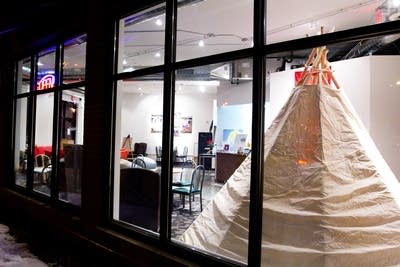Sami-themed coffee shop celebrates an arctic culture
Go Deeper.
Create an account or log in to save stories.
Like this?
Thanks for liking this story! We have added it to a list of your favorite stories.

Plenty of cafes can serve up a decent latte. But only the Lavvu Coffee House in Minneapolis lets customers sip espresso around a fire inside a traditional reindeer herder's tent.
The fire is actually electric. And, the tent is technically a lavvu, explains shop owner Chris Pesklo.
"It looks very similar to a teepee," Pesklo said. "But it's structurally different. Its angles are less extreme so it's more stable in high winds. This thing is what dominates the whole coffee shop."
For centuries, lavvus were the standard dwellings of the Sami, the indigenous people of the far northern regions of Norway, Sweden, Finland and Russia. Pesklo comes from a family of Norwegian Sami and he has designed his whole shop around the culture of his ancestors. The counters display historical facts about the little-documented nomads. The baristas are trained in Sami-style brew.
Turn Up Your Support
MPR News helps you turn down the noise and build shared understanding. Turn up your support for this public resource and keep trusted journalism accessible to all.
"First it has to boil ferociously," Pesklo said. "Let it cool down. Then you raise it to a boil again and you mix it with spices such as nutmeg, but also adding salt. A lot of Sami put melted cheese into it. The cheese gets swirled around. That's very much a part of the Sami tradition."

Cheese may not be everyone's favorite coffee flavoring, Pesklo admits. Lavvu also sells cappuccinos, mochas and cake-flavored lattes. But no matter what customers drink, Pesklo said he hopes they leave Lavvu with a greater understanding of his reindeer-herding relatives.
"This map represents nine of the Sami languages," Pesklo said pointing to the wall. "What they don't show here are that three of the languages are now extinct."
Minnesota is home to more Scandinavian descendants than any other state. But the way Pesklo sees it, too few know the tumultuous history of the Scandinavian Sami.
"Sami are the people who were more derogatorily known as Laplanders. They were greatly oppressed," Pesklo said. "In Norway they had a program called 'Norwegianization.' The Sami often had to change their last names from Sami names into more Norwegian names if they wanted to own land."
Like many American Indians, Sami children were sent to boarding schools where their native languages were forbidden. Forced assimilation continued up until the1980s, when the first legal protections for the Sami were put in place.
"There has been a whole cultural renaissance amongst the Sami that has ricocheted over here into North America. This coffee shop is actually a reflection of that, too," Pesklo said.
It'd be hard to imagine a better Sami ambassador than Pesklo. His license plates read "lavvu" and he has turned his home garage into a factory for the traditional Sami tents. Pesklo is American-born, but he is Sami by blood. One of his grandmothers was the last of his relatives to immigrate from Norway.
Surrounded by wooden tent poles and rolls of fabric, Pesklo, a former social studies teacher, takes two 20-foot-long strips of thick cotton and begins sewing them together.
"Now this machine here is called a feed-off-the-arm chain stitch machine," Pesklo says with pride. "You can sew sails for the U.S.S. Constitution on this machine. It's about 50 years old. It's really heavy-duty and I love it."

Pesklo is the only lavvu maker in North America. His creations are used by Sami elders as well as Midwestern camping enthusiasts.
"My lavvus are now everywhere on every continent except Antarctica, which is probably still yet to happen."
Seated in the corner of his week-old cafe, Pesklo takes a sip of his favorite coffee drink, a sugar-free, decaf latte with whole milk and a twist of cinnamon, and then surveys the Sami-themed shop.
"Culture is highly personal," he said. "It gives you a feeling of belonging to a greater whole. Whether African American, Hmong, Norwegian, what have you. They're all very passionate about their culture in one way or another. The Sami are no exception."
The Twin Cities boasts Scandinavian gathering spots like the American Swedish Institute and Sons of Norway. But, Pesklo said, a once-oppressed group like the Sami, with an estimated worldwide population of just 80,000, has never been in a position to fund a formal cultural center.
"I'm hoping this coffee shop may be the first of other Sami cultural centers that the Sami can gather around to celebrate their culture, to promote their own ideals," he said.
Including a long-held heritage of hospitality.
"No Sami in his right mind would not have a pot of coffee ready to be served anywhere," Pesklo said.







